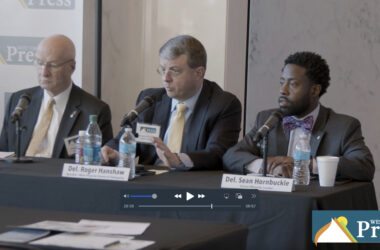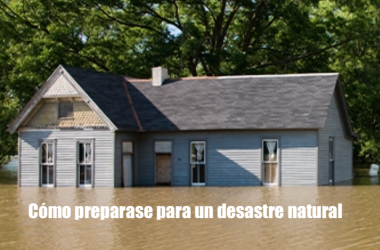By CHARLES OWENS
Bluefield Daily Telegraph
BLUEFIELD, W.Va. — Bluefield’s so-called “Bridge to Nowhere” is getting some national attention.

(Photo by Eric DiNovo)
A front-page article and related photographs Thursday in USA Today chronicled the long-struggle in southern West Virginia to build the King Coal Highway and Coalfields Expressway projects. In the newspaper report, area officials talked about the urgent need to secure additional federal and state dollars for the two future four-lane corridors, and how both projects would be an ideal fit for President Donald Trump’s proposed $1 trillion infrastructure plan.
“It has to help,” Gordon Lambert, president of the McDowell County Commission, said of the national attention generated by the newspaper article. “As I tell people if we don’t get it done now, it will never be built in our lifetime.”
Lambert, who is pictured on the front page of the USA Today article, said Trump can help the region by including both the King Coal Highway and the Coalfields Expressway in his proposed infrastructure bank plan.
“It could mean so much for us with the infrastructure taking place with the bridges and the whole deal,” Lambert said. “It is really important for tourism, manufacturing and everything. You’ve got to have the infrastructure before you can have the development. He (Trump) promised us he is going to help coal, and that is really going to make a big difference. They will need the metallurgical coal for steel and bridges.”
Mike Mitchem, executive director of the King Coal Highway Authority, said the national attention should help in promoting the local Interstate 73/74/75 corridor. He is hoping that both West Virginia Gov. Jim Justice and President Donald Trump will read the article.
“I think with some national (media) it should catch the president’s attention, and the governor is going to be working closely with the president so we will hopefully see some movement on the road,” Mitchem said. “I think the article got to the point that we really need roads in southern West Virginia — a couple of roads.”
“I thought the article was very well done, and very fair to the region,” Marc Meachum, president and chief executive officer of the Greater Bluefield Chamber of Commerce, added. “Hopefully, the powers to be in both Charleston and Washington will read it and understand what we’ve been trying to tell them for 30 plus years. The whole King Coal Highway project started downstairs in our conference room in the chamber. Even though I’m not on the King Coal Highway authority, we have a very keen interest in seeing it completed.”
Bill Archer, a member of the Mercer County Commission, also was quoted in Thursday’s USA Today article about the importance of completing the King Coal Highway.
“You know really I was thrilled that USA today had contacted me and it is my deepest wish that the highway could be completed in my lifetime,” Archer said. “It opens up so many opportunities for the southern West Virginia and Southwest Virginia coalfields. It is something that I really, really hoped for a long time and maybe this national attention will get that project off the drawing board and into the mountains.”
Construction on the King Coal Highway in Mercer County has been stalled since 2007. That was when the Christine West Bridge was completed. But the bridge and the interstate corridor comes to an abrupt end at Stoney Ridge — prompting some to refer to the twin interstate bridges as the “bridge to nowhere.”
The King Coal Highway, and its related Tolsia segment, is part of an interstate system that, when finished, will run from Detroit, Mich., to Myrtle Beach, S.C., bringing more people through the state each year. The projected cost of completing the West Virginia corridor is about $1.3 billion.
Richard Browning, executive director of the Coalfields Expressway Authority, also is hoping some good will come from the USA Today report.
“The more national press we get about it the better,” Browning said. “It can help bring attention to the fact that the southern coalfields here have powered this nation for many, many years. We are used to bad press in West Virginia. But I met these two gentlemen and went around with them for the whole day. I know they were not going to come back with something that would make West Virginia look bad. I think their efforts are sincere, and they are trying to shine a light on something that needs to happen here. We need a shot of money. Not more studies. We need a shot of bricks and mortar money here to get this done.”
Browning said southern West Virginia now needs help from the federal government.
“There is no better place — as I’ve said many times before — for the federal government to come in and fix what they have basically torn up, which is our way of life,” Browning said. “I feel like we have been abandoned here.”
Browning believes there are many areas where the federal government can help. He points to a number of local economic development plans that have been sidelined due to a lack of funding. For example, he said one plan was for the creation of a regional water project that would have served Mercer, McDowell and Wyoming counties. A second would have helped in extending high speed broadband in the deep south counties.
“We’ve got plans on the shelves in Charleston for highways sitting there gaining dust,” Browning said. “We’ve got a plan for a water system here for three counties to take water out of the R.D. Bailey Lake. But it’s still sitting there without money.”
While Browning is hopeful that Trump’s proposed infrastructure bank becomes a reality, he says distractions — including the ongoing fight to repeal and replace Obamacare — could sideline lawmakers. He also points to the ongoing budget crisis in West Virginia, and the ability of the state to match any federal dollars that are made available for highway projects in the state.
Also complicating matters is the fact that lawmakers in Charleston eliminated funding last year for both the King Coal Highway and the Coalfields Expressway authorities due to the statewide budget crisis. Both offices will soon run out of money — and may be forced to close their doors without a restoration of state funding.
“We are still operating on funds that my board and I saved over the years,” Browning said. “I’ve basically said when we run out of money I’m still going to work. But we are going to have to have some help from the county commissions to keep the lights on and the phone going.”
Progress has been slow on the Coalfields Expressway, a future four-lane corridor that will extend 62 miles in length in southern West Virginia. The West Virginia segment of the Coalfields Expressway will extend through Raleigh, Wyoming and McDowell counties. In Virginia, the Coalfields Expressway will extend another 51 miles from Pound in Wise County through Dickenson and Buchanan counties. The roadway also is known as U.S. Route 121 in Virginia.
To date only about seven paved miles of the Coalfields Expressway have been completed. There is a non-paved section of the road in McDowell County that was finished in 2001, but it is not currently usable.
See more from the Bluefield Daily Telegraph





